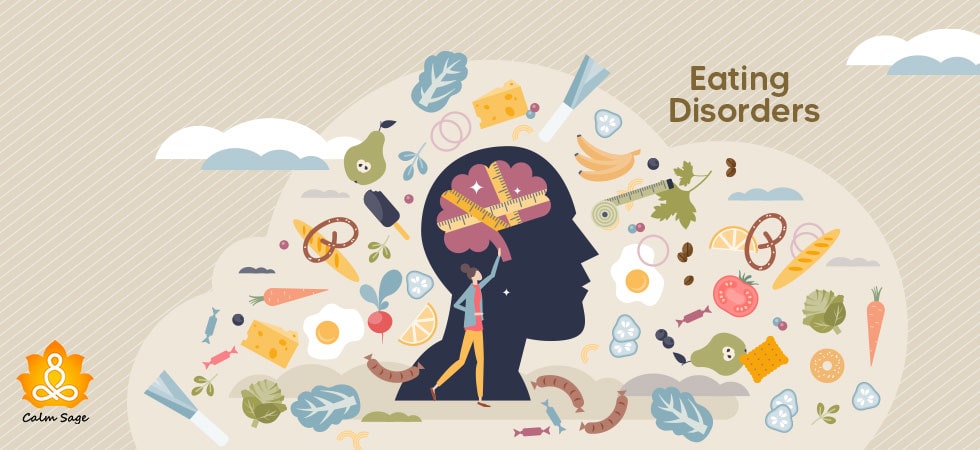Understanding And Overcoming Eating Disorders and Hypothalamic Amenorrhea

Hypothalamic amenorrhea is a physical health condition and eating disorders are known to be a psychological condition. You might be wondering…what’s the connection between these two?
Well, there’s a connection study that shows when a woman struggles with an eating disorder, the most common cause of lack of reproduction or periods can be the presence of hypothalamic amenorrhea. In this blog, let us find out the connection between eating disorders and hypothalamic amenorrhea and how to overcome it. So, let’s get started!
What are Eating Disorders?
Eating disorders are a range of mental health conditions wherein there is a persistent disturbance of eating behaviors and impairment of overall well-being. Eating disorders affect the way you think about eating, weight-gaining, weight-losing, and behaviors. If left undiagnosed or undertreated, eating disorders can impact your overall being and emotions in the long term.
What is Hypothalamic Amenorrhea?
Hypothalamic amenorrhea is a condition wherein females start missing their periods (menstruation cycles). Hypothalamus is present in the center of our brain and its main role is to regulate bodily responses such as hunger, temperature, and certain factors associated with menstruation.
Specifically, it helps in releasing gonadotropin hormone, follicle-stimulating hormone, estrogen, and luteinizing hormone which are important for controlling menstruation. When the hypothalamus stops producing the gonadotropin hormone, it can result in irregular periods or lack of periods. There are two main types of amenorrhea:
- Primary Amenorrhea: Primary amenorrhea happens when a female does not get her first period before the of 16 or within five years of puberty.
- Secondary Amenorrhea: Secondary amenorrhea happens when a female has regular periods but stops getting periods for more than three months. scientifically, hypothalamic amenorrhea is a part of secondary amenorrhea. Secondary amenorrhea is likely to develop due to excessive birth control use, hormonal shots, certain medications associated with schizophrenia, psychosis, or cancer, or being underweight or overweight.
Symptoms of Hypothalamic Amenorrhea:
- Acne
- Anxiety
- Cold hands and feet
- Depression
- Hair thinning or hair loss
- Headache or pelvic pain
- Frequent urination
- Lethargy
- Loss of regular periods
- Increased hunger
- Reduced sex drive or libido
- Sleeping issues
- Vaginal dryness
- Vision changes
The Connection Between Eating Disorders and Hypothalamic Amenorrhea
Scientifically, when a female struggles with an eating disorder, the most common cause can be the presence of hypothalamic amenorrhea (HA). Study shows that when the hypothalamus starts receiving off-kilter symptoms, it starts rebalancing the body by releasing hormones into the blood. And, when the hypothalamus is not able to restore balance, it causes hypothalamic amenorrhea.
As a result, an energy deficit occurs, herein less vital body functions are kept on hold which also includes reproduction procedures. If you think you or your loved one might be struggling with this condition, you must connect with a physical health provider.
A proper diagnosis must be made wherein the presence of HA can only be detected after ruling out the presence of other causes of amenorrhea. In the case of eating disorders followed by lack of periods, the most common cause is HA even when the weight is under control.
Research shows that female athletes might benefit a lot from the positive effects of exercise, however, due to special needs and concerns additional disorders surface the long-standing consequences. according to a study published by Science Direct, eating disorders, amenorrhea, and osteoporosis are the part of female triad.
Eating disorders and amenorrhea are likely to cause bone mineral density (BMD) which is not reversible in several cases. Hence, increasing the risk of osteoporosis.
Factors Contributing to Hypothalamic Amenorrhea
HA can be caused by weight loss, food restriction, stress, genetics, energy imbalance, and more. let us read about the contributing factors to hypothalamic amenorrhea in this section:
1. Energy Balance
According to studies, overexercising and undereating can also cause HA regardless of the body’s size. It’s really important to intake proper food to fuel up our body to function optimally, and when we deprive the body of energy, it can lead to long-term problems such as HA and more.
2. Exercise
Exercise can also contribute to HA as when we burn energy more than we require, we leave less energy for body functions, and as a result, our stress hormones get increased in the bloodstream.
3. Food Restriction
Restricting important groups of foods can also lead to the development of HA. Low-fat diets are likely to put us at risk of developing HA.
Related Read: The Indestructible Link Between Nutrition and Mental Health
4. Genetics
Study shows that genetics also play an important role in the development of HA as various factors determine the sensitivity towards reproductive systems.
5. Stress
Chronic stress increases the level of cortisol (stress-causing hormone) in the bloodstream which can stop the hypothalamus from releasing important hormones required for the proper functioning of the reproductive system.
6. Weight Loss
Weight loss or low body fat mass can also result in HA. Additionally, studies show that people with high body mass index (BMI) can also develop this condition. This is why it is important to maintain a normal range of BMI for overall well-being.
Treatment of Hypothalamic Amenorrhea and Eating Disorders
The goal of the treatment of HA is to sustain regular menstrual cycles. Therefore, maintaining a BMI or gaining appropriate weight can be the most important goals of the treatment. Typically, the above-mentioned factors also need to be addressed.
If you think you or your loved one might be struggling with an eating disorder followed by hypothalamic amenorrhea, it’s important to first connect with a physical health provider for proper diagnosis and treatment options. Here’s a small guide to diagnosing and recovering from an eating disorder:
- A Small Guide for Recovering from an Eating Disorder
- Types of Eating Disorder Therapy
- Alternative Treatments for Eating Disorders
Diet Tips to Manage Hypothalamic Amenorrhoea and Eating Disorders
- Adjust your overall energy intake according to your BMI. To calculate your BMI, you can refer to: BMI Calculator
- Add more carbohydrates and low-glycemic foods to your diet.
- Incorporate healthy fats in your diet such as extra virgin olive oil, avocados, nuts, and seeds
- Reduce high-intensity exercise and jump to gentle forms of exercise such as Pilates, walking, or yoga.
- Connect with a Nutritionist and Mental Health Provider to manage disordered eating patterns. To connect with a mental health provider through online platforms, refer to:

Great for a large network of licensed therapists
-
$60 to $90/week, billed every 4 weeks
-
Therapy via messaging, phone, or live video chat
-
Flexible cancellation at any time
20% off your first month

Great for CBT Based therapists
-
$40/week, billed every 4 weeks
-
Therapy via messaging, phone, or live video chat
-
Specialization for CBT based Therapy
20% off your first month

Best for Treatment Plants
-
$60 to $90/week, billed every 4 weeks
-
Therapy via messaging, phone, or live video chat
-
Flexible cancellation at any time
$100 off your first month with code SPACE
Frequently Asked Questions
Is hypothalamic amenorrhea reversible?
Studies show that hypothalamic amenorrhea is potentially reversible wherein there are no organic or anatomic abnormalities related to the hypothalamic hormone that can be identified. This condition is often associated with weight loss, excessive exercise, or stress. Functional hypothalamic amenorrhea is present in primary and secondary amenorrhea.
Hypothalamic amenorrhea is seen which syndrome?
HA can accelerate the onset of syndromes such as vaginal atrophy and osteoporosis. in cases of extreme impact on brain health, HA can also lead to increased risk of neurological syndromes such as Alzheimer’s disease and dementia.
Is it PCOS or hypothalamic amenorrhea?
In some cases, PCOS and hypothalamic amenorrhea get misdiagnosed due to some similarities. Here’s how you can differentiate between the two:
Key differences between Hypothalamic Amenorrhea and PCOS
| Hypothalamic Amenorrhea | PCOS |
|---|---|
|
|
|
|
|
|
|
|
Can your period come back after an eating disorder?
Studies show that when a female loses their periods due to an eating disorder, achieving a healthy weight or normal BMI range is what defines healthy again for them. If you are recovering from an eating disorder and fall within the normal BMI range, you are likely to get a healthy period cycle.
I hope this blog helps you understand the connection between hypothalamic amenorrhea and eating disorders.
For more such content, connect with us through all social media platforms.
Thanks for reading!




















